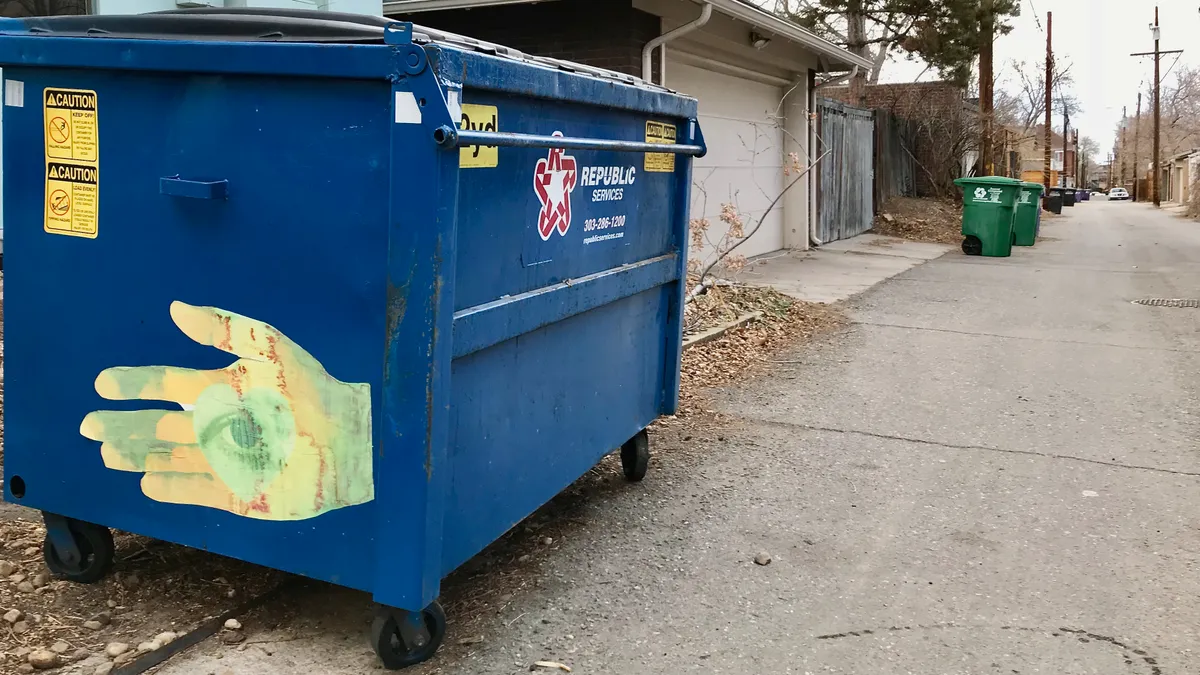Q2 Earnings
| Revenue | $2.5B |
| YoY Change | 3.9%▲ |
| Adjusted EBITDA | $690M |
Recycling markets are still in a slump, but Republic Services CEO Don Slager said that "growth in the solid waste business is more than offsetting the headwind" and remained upbeat about turning this increasingly small portion of the company's revenue around during the second quarter earnings call.
This follows comments from Slager during the first quarter call about how the market disruption could be an opportunity, with even more specificity on how Republic is broaching the topic with customers. Republic has already seen success raising processing rates for open market commercial customers and third-party MRF tonnage, but said municipal contracts will take more time.
Municipal Recycling:
- Of the company's 1,100 municipal customers, Slager said 10% have agreed to "incremental" price increases. Another 60% are "reviewing and approving price adjustments or considering implementing the new pricing structure by the next contract cycle."
- While the average five-year contract length and "political aspect" of decision-making could slow discussions, Republic is heartened by early signs. "The good news is individuals, consumers want to recycle, staff wants to recycle and certainly city councils and mayors don't want to give up recycling," said Slager, while noting that "We certainly have a handful of customers who kind of scoffed at it. We'll have to reassess whether we like that partnership or not."
- Republic is trying to frame a doubling or triple in rates down to "the lowest denominator" by showing how this is still less than the average person pays for their Internet service or a "cup of designer coffee." Otherwise "when you aggregate that spend to 10,000 residents, then the decision maker gets nervous ... because it becomes a big dollar amount."
With Republic's average commodity prices — excluding glass and organics — down 42% YoY, the company is also looking for ways to optimize its sorting technology and access different markets. According to Slager, roughly 60% of material now stays domestic and "we're virtually sending nothing to China."
A sustained demand for packaging feedstock around the world has helped Republic "move paper pretty easily to other markets" — a rosier version of the story Republic is telling in Seattle or other areas — and is seen as a sign that a new system will emerge from this Chinese catalyst.
Exactly what that new system will cost, and how soon those increases should kick in, is an evolving question. Not every local government may have the flexibility to change terms mid-contract for budgetary reasons. Though for many of them, recycling is also a critical service that needs to continue due to disposal constraints or broader environmental targets. For Republic and its shareholders, recycling is a "product" that some people are willing to pay more for to "feel good about doing something for the environment."
Figuring out just how much responsibility service providers have to keep U.S. recycling systems functional, especially in areas without clear state or local requirements, is an increasingly complex discussion that will play out for years to come. For Republic and other large competitors, the math is clear.
"We're only going to invest in recycling where the returns are warranted and where the construct of the contract is fair and reasonable and equitable," said Slager.
Other News:
As has been the case for multiple quarters now, Republic continues to report positive signs in just about every other area of business.
- Republic spent $56 million on tuck-in acquisitions during Q2, plus $42 million in July, bringing its M&A spend to $123 million so far. The company expects to hit $200 million for 2018, and continue spending $100-150 million "for several years at least."
- The company has now converted $590 million, or about 25% of its CPI-based contracts, to "a waste-related index or a fixed-rate increase of 3% or greater for the annual price adjustment."
- $328 million was spent on dividends and share repurchases, and Republic's board approved a 9% increase in the quarterly dividend. This marks the ninth consecutive year the dividend was increased.
Looking Ahead:
- Labor pressures are an ongoing conversation in the industry, but Republic claims to have a lower turnover rate than anyone else. Both the time required to fill open positions and turnover rate for technicians were down YoY. Though Slager did say Republic is raising wages and "rethinking some of our pay plans" in certain markets.
- Slager said he hopes to eventually get pricing to a 3% yield in the future and is aspirational that $700 million worth of contracts could eventually be converted to the CPI model. "We're not talking about light speed here. But when you factor in a very nice steady diet of 1% to 2% volume, price in excess of inflation, the model sings a very nice song and we're going to continue to build on a great cash flow."
- Republic reaffirmed its full-year EPS guidance of $3.05-3.10 and adjusted free cash flow of $1.09-1.114 billion. The company expects to come in at the low end of those ranges if commodity prices remain at July levels.















